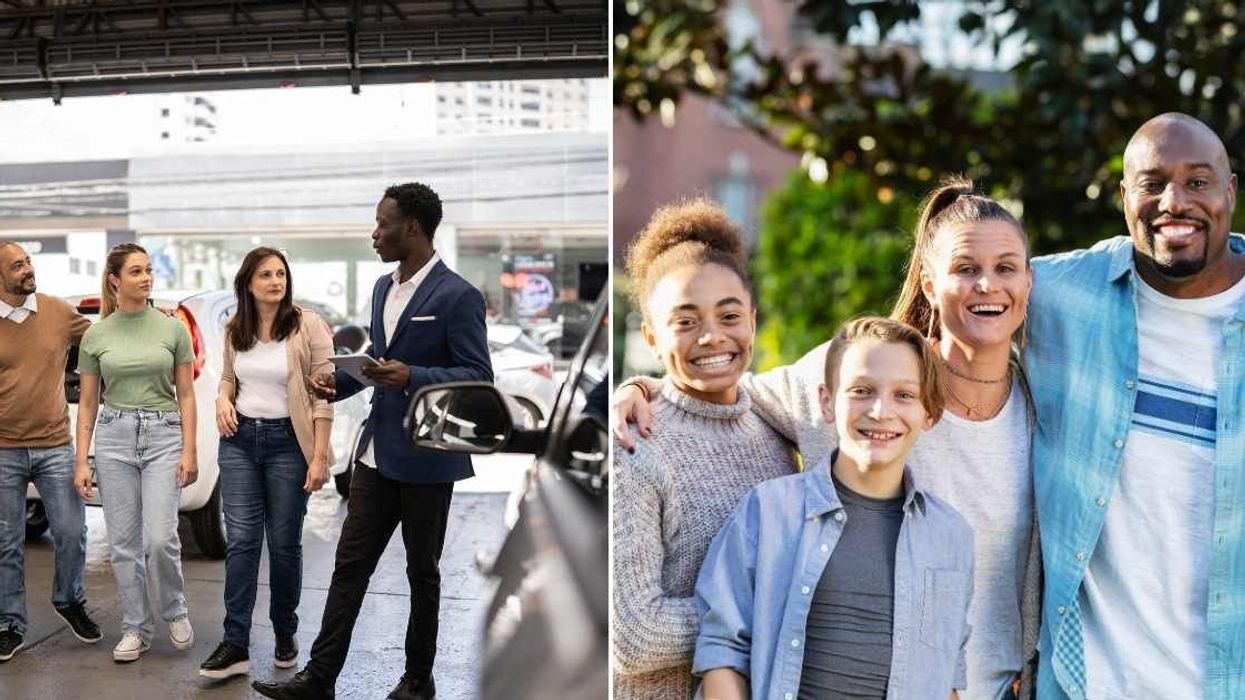Trigger Warning: This article contains themes of suicide, abuse and violence that some readers may find distressing.
Several people take family for granted but the true value of having loved ones around is something that only those growing up in foster care know about. Not only does it leave a void in their heart, but also instills the belief in them that love is supposed to be conditional. Davon Woods spent the initial 27 years of his life without a stable family facing dejection and desolation, before he was able to become a part of a loving family. One day in April 2021, when he was at his job as a car salesman, a family walked into the showroom. Unable to hold it in any longer, a vulnerable Davon expressed his desire to be a part of the family and this wholehearted confession changed his life forever, reported LoveWhatMatters.

Davon is one of the thousands of foster care children who grow up with a traumatic backstory. Right after he and his twin brother were born, they were thrown into foster care because their biological mother was unaware that she was pregnant and didn’t even visit a doctor until she got into labor. “We weighed about 2 pounds each. They said we were so small we could’ve fit in a shoebox together, and we came back positive for crack,” Davon told LoveWhatMatters. The brothers spent two years in foster care before they were adopted by the Woods family.

But even an adoption didn’t mark the end of their misery as things got worse. “We had a very difficult childhood with our adoptive family,” Davon shared. “We got physically and verbally abused, we were never given a voice, and they never once told us they loved us. It felt like we were just a paycheck, but we were too young and afraid to tell anyone what was happening at home.”

Like many foster care children, the lives of Davon and his brother were filled with uncertainty, confusion, and a lot of unprocessed traumas. Davon even attempted suicide many times. “I didn’t want to live anymore because of how we were being treated, but I was never able to go through with it because I didn’t want to leave my brother alone with them,” he recalled. By the time he was 11 years old, his excruciating reality drove him into the dark realm of drugs. At the age of 18, Davon became a drug dealer. To escape their sorrow, Davon and his brother moved to Georgia.

In Georgia too, they ended up getting pulled into the shadows. “We ended up getting involved in the gangs there,” Davon explained. “We saw people get shot in front of us. There were times we got guns drawn on us. We could’ve lost our lives.” Then one day, their relatives from the Woods family visited them and invited them to Church. They were reluctant to go, but when they did, their lives took a positive shift. The encounter with spirituality made them feel as if the emotional holes in their heart were being filled, and they felt healed.
Soon enough, they were taking up different jobs, away from the brutal life in the streets, before Davon settled into his role as a car salesman. That’s where he met the Wilkinson family who visited the showroom, and this reignited his long-standing dream of having a family. He requested them to take him into their family and in August 2021, the Wilkinsons invited Davon over for dinner, and later that year, for Thanksgiving. After about a year of knowing them, Davon asked them if he could be a part of their family and add their last name to his name, to which they agreed.
“I just want you guys to know that you mean the world to me,” Davon can be seen telling his family in a heartwarming video. “I never had a mother to hug me, love me or show me any affection. I never had a father to teach me different things or spend quality time with, and you all showed me the definition of family.” After he became a part of this family, Davon described his feelings to LoveWhatMatters, “In them, I’ve gained a mom and dad, brothers and sisters, and a niece. I’ve gained the white family I made up as a confused child. It goes to show: color doesn’t make you family, and neither does blood. Love makes you family."
@davonwoodsfc Family isn’t blood family is LOVE ❤️#greenscreen #family #love #davonwoods #fyp #mom #adoption #greenscreenvideo #happybirthday
Since then, Davon has quit his job and founded “Foster Kids Matter,” an organization dedicated to serving foster children in Georgia.
@davonwoodsfc Asking them if the would become my forever family ❤️🙏🏽 #fosterkidsmatter❤️ #fostercare #davonwoods #adoption #share #love
You can follow Davon (@davonwoodsfc) on Instagram and TikTok for more updates on his attempts to raise awareness about foster kids.


















 Revenge can feel easier than forgiveness, which often brings sadness or anxiety.
Revenge can feel easier than forgiveness, which often brings sadness or anxiety. 
 In the past two years, two malaria vaccines have become available for babies starting at 5 months of age.
In the past two years, two malaria vaccines have become available for babies starting at 5 months of age. By exploiting vulnerabilities in the malaria parasite’s defense system, researchers hope to develop a treatment that blocks the parasite from entering cells.
By exploiting vulnerabilities in the malaria parasite’s defense system, researchers hope to develop a treatment that blocks the parasite from entering cells. Created with
Created with 

 Volunteers who drive homeless people to shelters talk with a person from Ukraine in Berlin on Jan. 7, 2026.
Volunteers who drive homeless people to shelters talk with a person from Ukraine in Berlin on Jan. 7, 2026.
 Tasks that stretch your brain just beyond its comfort zone, such as knitting and crocheting, can improve cognitive abilities over your lifespan – and doing them in a group setting brings an additional bonus for overall health.
Tasks that stretch your brain just beyond its comfort zone, such as knitting and crocheting, can improve cognitive abilities over your lifespan – and doing them in a group setting brings an additional bonus for overall health. Overdoing any task, whether it be weight training or sitting at the computer for too long, can overtax the muscles as well as the brain.
Overdoing any task, whether it be weight training or sitting at the computer for too long, can overtax the muscles as well as the brain.

 Amoxicillin is a commonly prescribed broad-spectrum antibiotic.
Amoxicillin is a commonly prescribed broad-spectrum antibiotic.  Chart: The Conversation, CC-BY-ND
Chart: The Conversation, CC-BY-ND
 Counterintuitively, social media can make you feel more bored and lonely.
Counterintuitively, social media can make you feel more bored and lonely. Talking about what you’ve read can add a social dimension to what can be a solitary activity.
Talking about what you’ve read can add a social dimension to what can be a solitary activity.